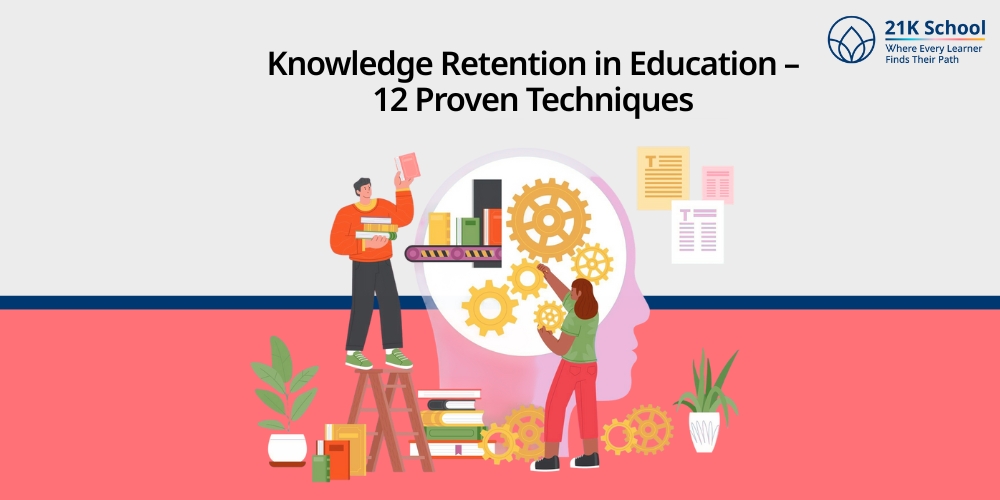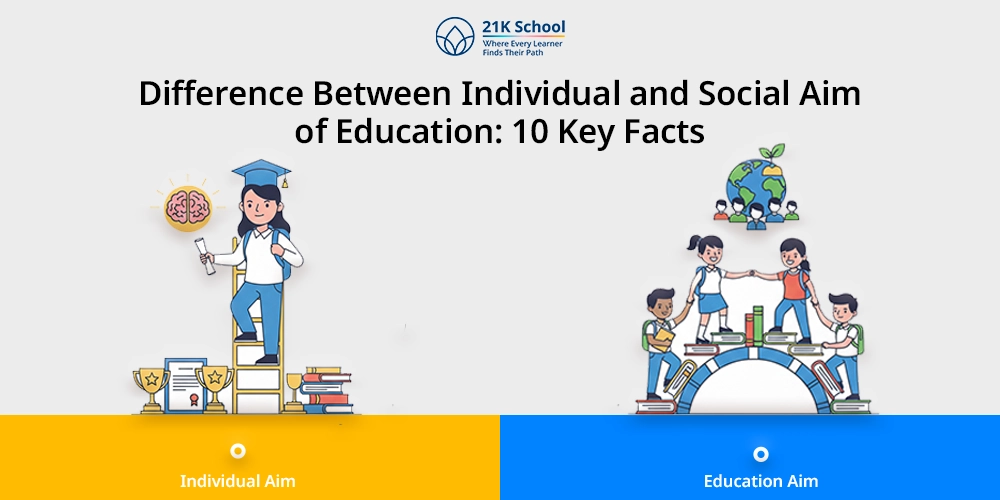
In this evolving world of learning students spend a lot of time struggling with one major problem such as “Knowledge Retention in Education ”.
Learning is impactful when it is remembered and used at the right point of time which can only be done by retention of knowledge.
Learners spend countless hours to retain information or concepts especially during exam time. To ensure good marks learners often prioritise knowledge retention.
In this blog, we will go through a detailed understanding on knowledge retention in education including proven ways for learners and why it is important.
Contents
- 1 What is Knowledge Retention in Education?
- 2 12 Proven Strategies to Improve Knowledge Retention in Education
- 2.1 1. Active Learning Techniques
- 2.2 2. Spaced Repetition
- 2.3 3. Visual Learning
- 2.4 4. Peer Teaching
- 2.5 5. Real-World Applications
- 2.6 6. Mindfulness & Focus Practices
- 2.7 7. Elaborative Interrogation
- 2.8 8. Dual Coding
- 2.9 9. Interleaving
- 2.10 10. Concrete Examples
- 2.11 11. Disturbed Practice
- 2.12 12. Multisensory Learning
- 3 How to Implement Knowledge Retention Strategies in Education?
- 4 Common Challenges and Solutions in Implementing Knowledge Retention Strategies in Education
- 5 Conclusion
What is Knowledge Retention in Education?
In education, knowledge retention means the capacity of students to retain or store information in mind for a longer period.
And the objective of knowledge retention is to retain or store the important information and recall it whenever needed. For example, class test, practical assessment or yearly examinations.
If you are seeking, why is knowledge retention important in education ? It is because:
1. Better Exam Performance:
The primary or main objective of knowledge retention in education is students want to perform better in examinations.
Instead of last minute exam stress students can work on habits of learning which help them to work under pressure.
2. Application in Real-World Scenarios
Knowledge retention is not limited academic performance but also applied in real-world situations.
Learners can easily resolve academic challenges, achieve personal and professional objectives by memorising facts and data.
3. Preventing Learning Loss:
Forgetting the important concepts learned earlier can negatively impact learners. This happens due to unplanned or unstructured learning.
They can avoid learning loss by regularising daily activities, learning time, and grasp new and complex concepts with strategies.
4. Building a Foundation for Higher Learning:
Education is designed in different stages or levels from easy to hard order. Previous levels always help students to learn upcoming concepts effectively.
To ensure good marks in exams , knowledge retention of previous grades are important for learners.
12 Proven Strategies to Improve Knowledge Retention in Education
To improve knowledge retention in education parents, facilitator and students must implement the below mentioned top 12 proven strategies:
1. Active Learning Techniques
Active learning techniques in knowledge retention means learners are engaged in various educational activities such as discussions, problem-solving , role-play, or projects.
Instead of passive education, active learning helps them to strengthen memory connection.
2. Spaced Repetition
One of the ideal techniques known as spaced repetition is an ideal way in which learners gradually increase the interval of repeated learning to strengthen memory power.
One of the common examples is a student learning a topic after a day, one week, one month.
3. Visual Learning
Visual learning ensures different interactive and engaging visual effects. This improves the memory retention of learners.
Visual learning includes charts, infographics, mind maps, and videos etc are mainly used by facilitators and parents.
4. Peer Teaching
Different learners feel different topics are easy and hard. Sharing knowledge by peer teaching is one of the ideal ways to retain difficult concepts without stressing out.
Students can easily enforce knowledge to each other in a more simplest way which leads to memory retention.
5. Real-World Applications
Practical assessment is also popular as real world applications of different concepts. These knowledge are easier to retain and recall whenever a learner needs it.
Various science experiments , internships, or case studies. This ensures one can connect practical experience and theoretical knowledge .
6. Mindfulness & Focus Practices
Students with a distracted mind always struggled to retain and recall the important information, especially in exams.
It’s important to relax, focus and stay present while learning to retain maximum information.
7. Elaborative Interrogation
It is one of the strategies of knowledge retention where asking “why” questions to deepen understanding.
Here’s an example, instead of memorising the process of the water cycle, students ask why it happens in this sequence.
8. Dual Coding
As names suggest dual coding means the combination of visual and verbal explanation of learning.
One of the simple examples of dual coding is students learning biology concepts such as cell structure with diagrams.
9. Interleaving
Interleaving is a technique of knowledge retention in education especially used by students where they learn different concepts of a subject in one session.
For example, learning geometry, algebra, probability and matrix mixes topics in one session. This builds problem-solving skills and critical thinking skills .
10. Concrete Examples
Concrete examples help learners to improve memory retention.
This can be done by connecting abstract concepts to tangible, real-world situations through descriptions, stories, illustrations, or objects.
11. Disturbed Practice
It is a long term knowledge and retention in which a topic is learned over a longer period of time in smaller increments to improve retention.
For example, a learner studies everyday one hour for a week instead of last minute cramming.
12. Multisensory Learning
With the help of multiple senses like seeing, hearing, and touching learners can boost learners retention.
Students who are learning a second language can hear the other person’s conversation and practice accordingly.
How to Implement Knowledge Retention Strategies in Education?
Implementation of knowledge retention strategies in education is mentioned above to help learners in continuous learning , decision making, motivation, confidence and exam preparation.
However, implementing in correct manners is also important to achieve desired goals. Some effective steps include:
1. Curriculum Design
Schools can have structured curriculum for effective implementation of knowledge retention strategies in classroom learning .
2. Technology Integration
Technology in education such as use of digital tools, gamification in learning increase students engagement and interest.
3. Collaborative Classrooms
By encouraging strategies like peer-to-peer education , group projects discussion and debates are some ideal ways to implement knowledge retention strategies.
4. Practical Assessments
Practical assessments like real life projects and open book exams are also helpful to execute retention strategies.
Common Challenges and Solutions in Implementing Knowledge Retention Strategies in Education
While implementing knowledge retention strategies in education one can deal with some common challenges such as:
1. Time Constraints
Most of the schools rush to complete the syllabus instead of working on memory retention or spaced repetition.
By prioritising difficult concepts and repeat learning with time management skills leads to good results.
2. Student Resistance
Various traditional learning techniques of learning for example, memorisation can lead to anxiety and stress in students .
By reinforcing new and effective strategies for knowledge retention in modern education .
3. Teacher Workload
Various engaging sessions can increase facilitators classroom work load.
Use of different digital resources and collaborative platforms and apps can be a right solution.
4. Technology Gaps
Technology plays an important role and lacking it can reduce the opportunity to gain extra knowledge and retention.
Real life or practical knowledge, group discussions and debates can give similar results to learners.
Conclusion
Knowledge retention works as a main pillar of education where learners freely enjoy appreciation and good marks throughout their learning journey.
With effective knowledge retention one can deal with anxiety, stress, confusion in concepts and be able to tackle real world challenges.
However, implementation of above mentioned 12 proven strategies to improve knowledge retention in education ensures knowledge lasts longer than classroom learning.
So, use the right planning support and strategies to transform the learning experience with confidence.

